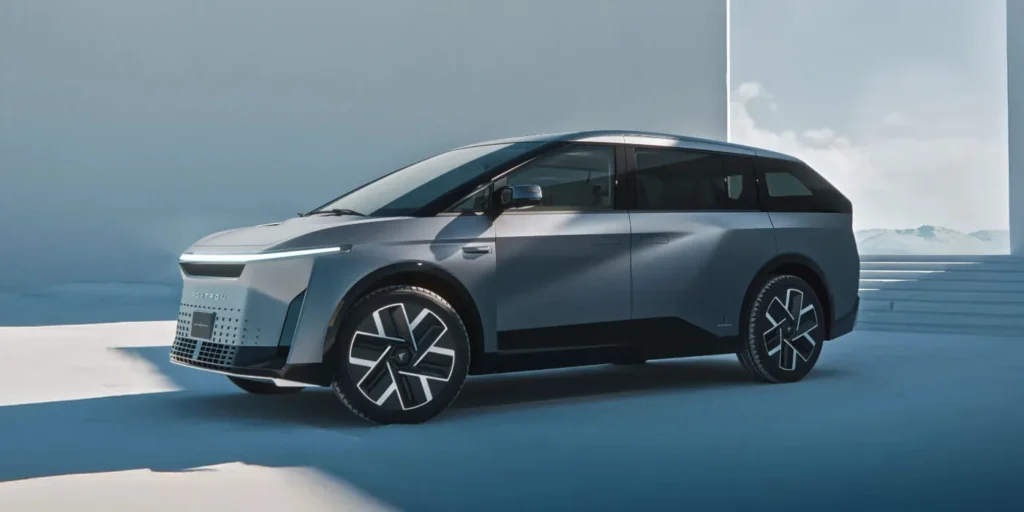Foxconn May Bring EVs to America Beginning in 2025
The U.S. electric vehicle (EV) market has already seen an influx of Chinese-made models, or at least EVs from Chinese-owned companies. Geely Holding Group already has a firm foothold in America thanks to its ownership of Polestar, Volvo, and Lotus. Another major player in the region is making moves, Taiwan’s Foxconn.
Foxconn, the Taiwanese electronics giant best known for assembling iPhones — is ramping up efforts to become a global force in electric vehicles under its Foxtron brand. At a recent press conference on April 9, Jun Seki, a top Foxconn executive, outlined plans for six new battery electric models. Two of those are destined for the U.S. market, with the first set to arrive as early as late 2025.
Foxconn has been eyeing the EV space for years. After acquiring Lordstown Motors’ Ohio production facility, the company planned to build vehicles for other automakers, including the ill-fated Lordstown Endurance pickup and Fisker’s PEAR model. Neither of those projects panned out, but Foxconn is clearly not backing down.
According to Seki, Foxconn now has the full toolbox to design, engineer, and manufacture EVs, and is poised to become a major contract manufacturer in the industry — just as it did with consumer electronics.

Meet the Foxtron Models Coming to America
Two Foxtron-branded models are expected to arrive in the U.S.:
Model C – A sleek crossover that’s already being sold in Taiwan as the Luxgen N7. It will be the first to hit American roads, with customer testing expected by late 2025.
Model D – A multi-purpose vehicle (MPV) designed by Pininfarina, with U.S. availability expected by 2027.
Initially, both models will be built in Taiwan and exported globally. However, Foxconn hinted at future U.S. production — likely at its Lordstown, Ohio plant, although that hasn’t been confirmed.
Beyond these two, Foxconn also has ambitious plans for global models like the Model B (compact crossover), Model E (sedan), Model A (compact van), Model T (large bus), and Model U (minibus).
Navigating Tariffs and Trade Tensions
Foxconn’s expansion into the U.S. EV market comes amid escalating trade tensions between the U.S. and China, with new tariffs potentially complicating vehicle imports. While Foxconn is technically a Taiwanese company, its ties to Chinese manufacturing and suppliers may still draw scrutiny. That geopolitical backdrop could push Foxconn to accelerate plans for domestic U.S. production.
Taiwan, China, and the Geopolitical Backdrop
The story of Foxconn’s EV push into the U.S. can’t be separated from the broader political dynamics surrounding Taiwan and China.
China views self-governed Taiwan as a breakaway province — one that it believes will eventually be brought under Beijing’s control. Crucially, China has not ruled out the use of force to achieve that goal.
Taiwan, on the other hand, sees itself as a sovereign entity. It operates with its own democratic government, a distinct constitution, and leaders elected by its 23 million people.
While Taiwan maintains strong economic and cultural ties with China — including trade, business, and family connections — the island’s identity is shifting. Over the years, surveys show a growing number of people in Taiwan identify as exclusively Taiwanese, rather than Chinese or both.
A Watch-and-Wait Situation
Whether or not these Foxtron models make it into American showrooms on schedule remains to be seen. The Model C looks like it’s leading the charge, but market conditions, regulatory hurdles, and consumer interest will all play a role.
Still, one thing is clear: Foxconn is betting big on EVs, and it’s positioning itself to compete globally. For U.S. consumers, that could mean more affordable and tech-forward electric options hitting the market in the not-so-distant future.
Stay tuned — the EV game is only getting more interesting.

Electric Vehicle Marketing Consultant, Writer and Editor. Publisher EVinfo.net.
Services